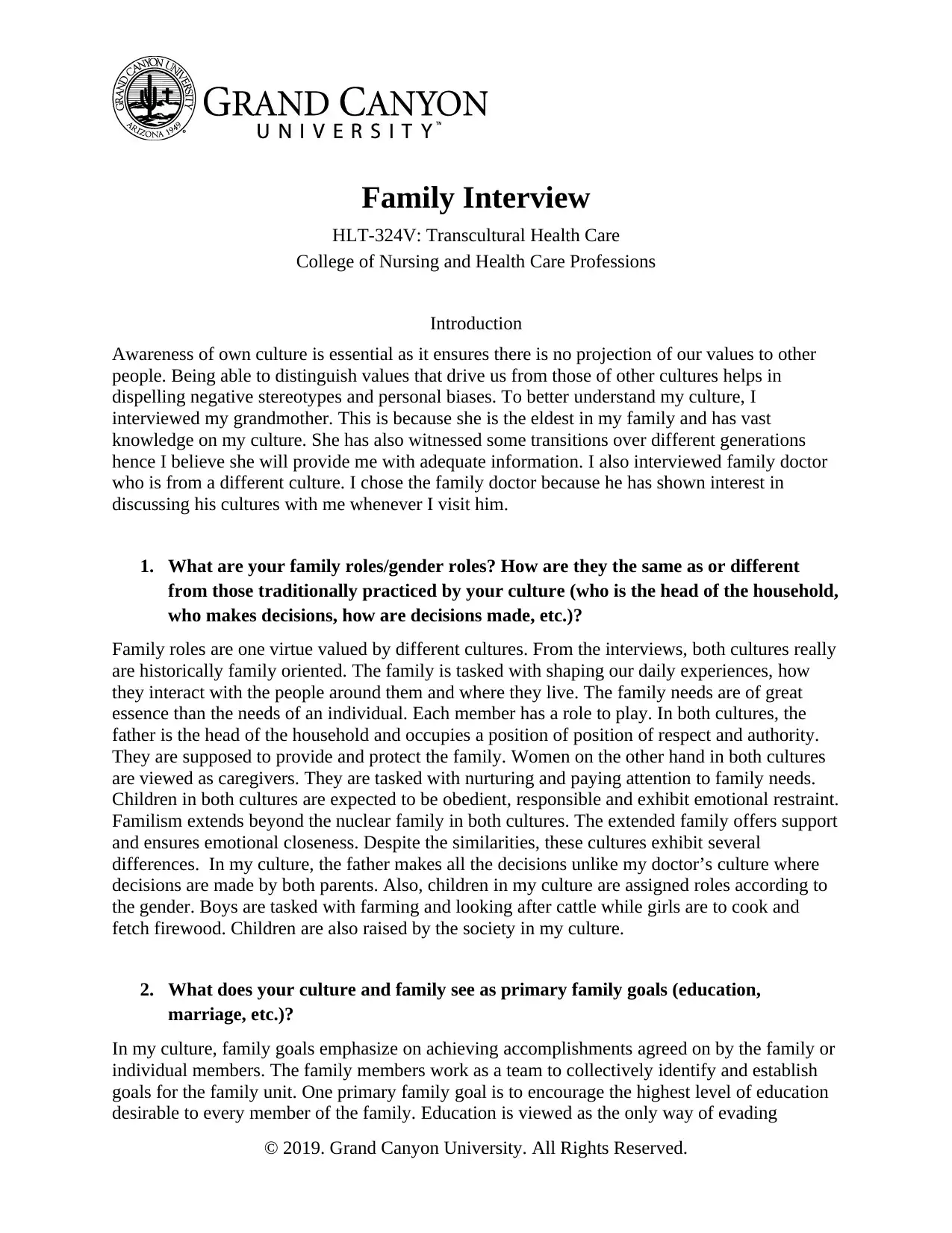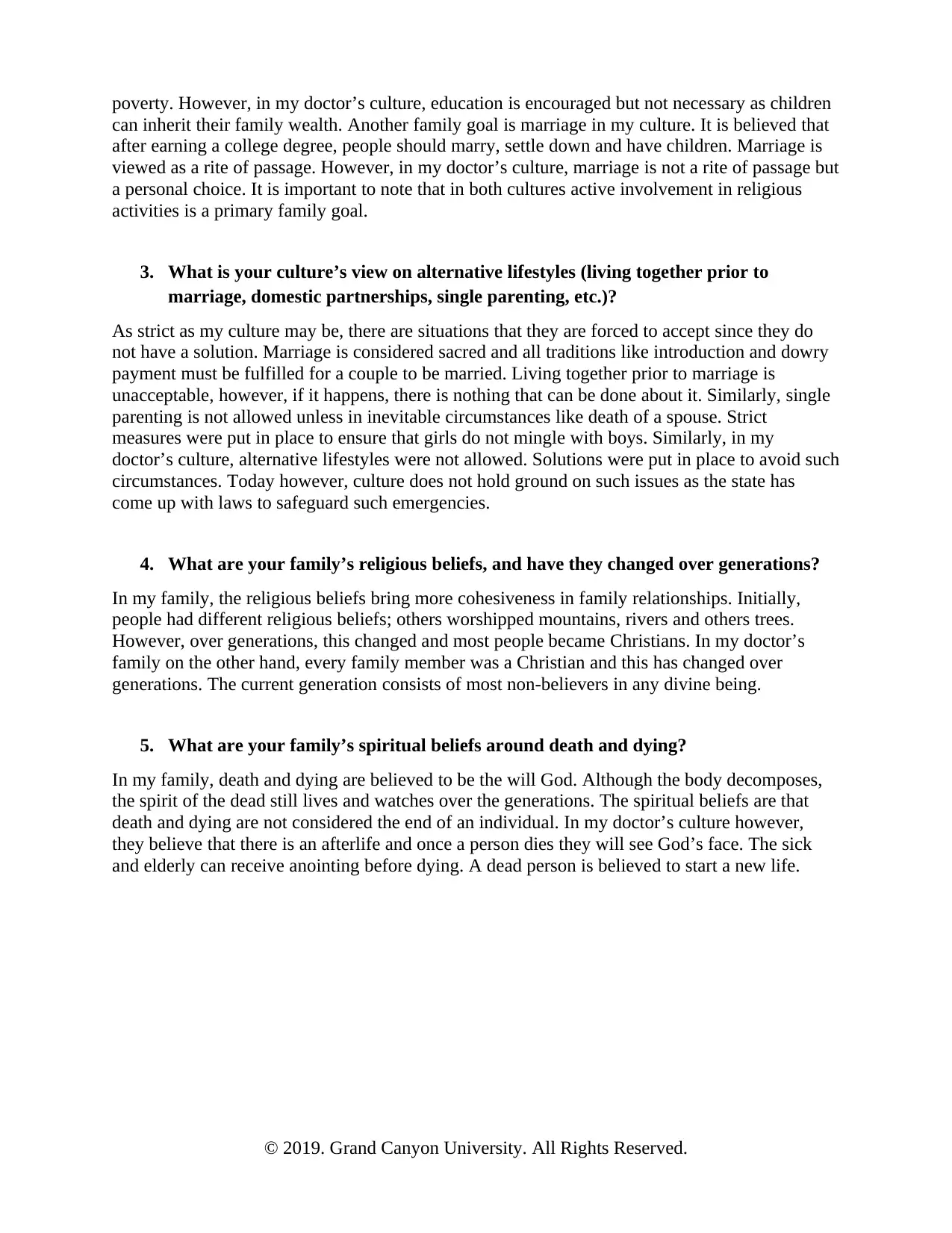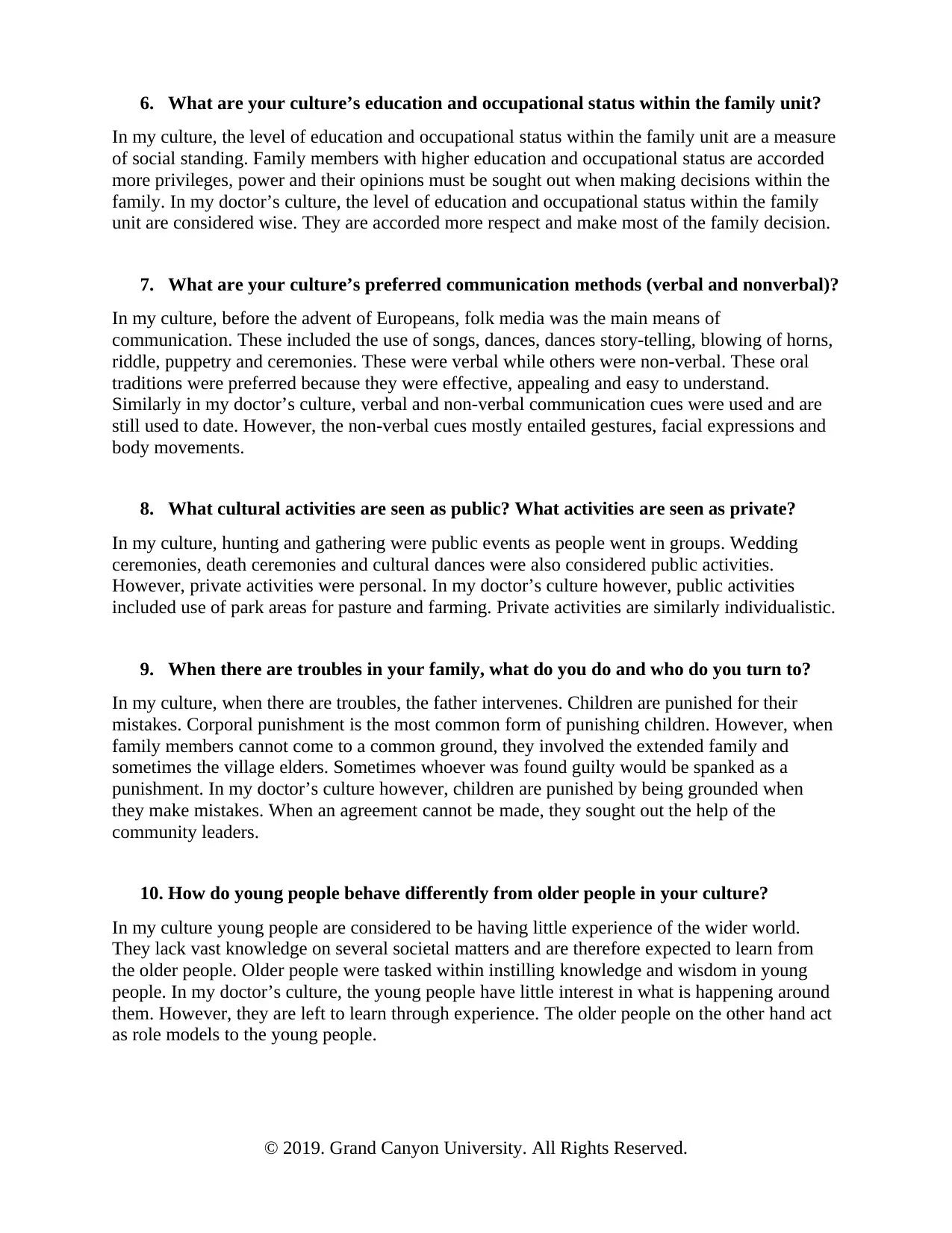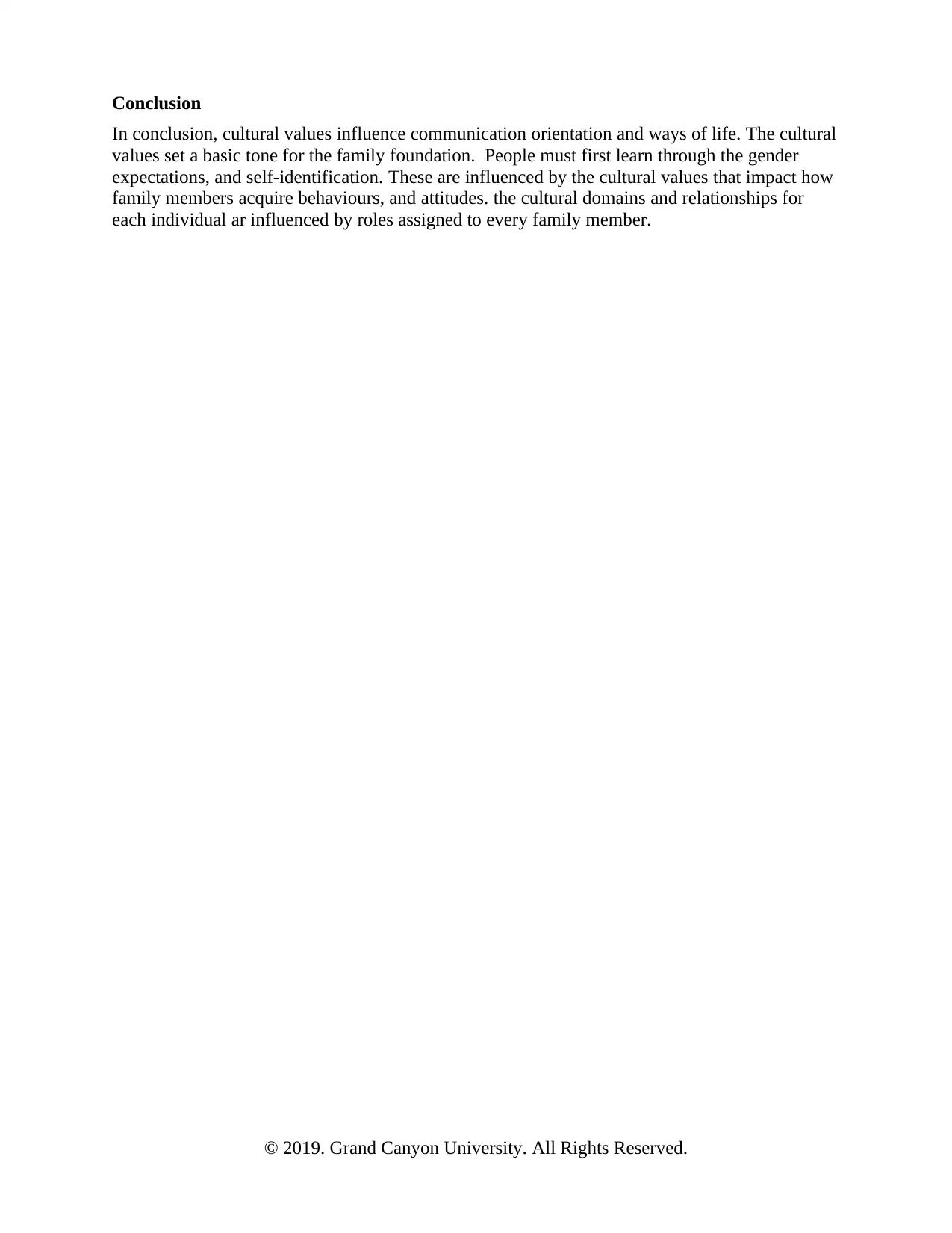Family Interview: Compare and Contrast Cultures in HLT-324V
VerifiedAdded on 2022/09/10
|4
|1618
|54
Homework Assignment
AI Summary
This assignment presents a student's exploration of transcultural healthcare through family interviews. The student interviewed a family member and a family doctor from a different culture to understand and compare family roles, gender roles, primary family goals (education, marriage), views on alternative lifestyles, religious beliefs, and spiritual beliefs around death and dying. The interviews also covered education and occupational status, communication methods, cultural activities, and responses to family troubles. The student highlights similarities and differences between the two cultures, emphasizing the impact of cultural values on communication and family foundations. The assignment adheres to the provided interview template and addresses the key questions outlined in the brief, providing valuable insights into the diverse aspects of family life and cultural practices within the context of healthcare.

Family Interview
HLT-324V: Transcultural Health Care
College of Nursing and Health Care Professions
Introduction
Awareness of own culture is essential as it ensures there is no projection of our values to other
people. Being able to distinguish values that drive us from those of other cultures helps in
dispelling negative stereotypes and personal biases. To better understand my culture, I
interviewed my grandmother. This is because she is the eldest in my family and has vast
knowledge on my culture. She has also witnessed some transitions over different generations
hence I believe she will provide me with adequate information. I also interviewed family doctor
who is from a different culture. I chose the family doctor because he has shown interest in
discussing his cultures with me whenever I visit him.
1. What are your family roles/gender roles? How are they the same as or different
from those traditionally practiced by your culture (who is the head of the household,
who makes decisions, how are decisions made, etc.)?
Family roles are one virtue valued by different cultures. From the interviews, both cultures really
are historically family oriented. The family is tasked with shaping our daily experiences, how
they interact with the people around them and where they live. The family needs are of great
essence than the needs of an individual. Each member has a role to play. In both cultures, the
father is the head of the household and occupies a position of position of respect and authority.
They are supposed to provide and protect the family. Women on the other hand in both cultures
are viewed as caregivers. They are tasked with nurturing and paying attention to family needs.
Children in both cultures are expected to be obedient, responsible and exhibit emotional restraint.
Familism extends beyond the nuclear family in both cultures. The extended family offers support
and ensures emotional closeness. Despite the similarities, these cultures exhibit several
differences. In my culture, the father makes all the decisions unlike my doctor’s culture where
decisions are made by both parents. Also, children in my culture are assigned roles according to
the gender. Boys are tasked with farming and looking after cattle while girls are to cook and
fetch firewood. Children are also raised by the society in my culture.
2. What does your culture and family see as primary family goals (education,
marriage, etc.)?
In my culture, family goals emphasize on achieving accomplishments agreed on by the family or
individual members. The family members work as a team to collectively identify and establish
goals for the family unit. One primary family goal is to encourage the highest level of education
desirable to every member of the family. Education is viewed as the only way of evading
© 2019. Grand Canyon University. All Rights Reserved.
HLT-324V: Transcultural Health Care
College of Nursing and Health Care Professions
Introduction
Awareness of own culture is essential as it ensures there is no projection of our values to other
people. Being able to distinguish values that drive us from those of other cultures helps in
dispelling negative stereotypes and personal biases. To better understand my culture, I
interviewed my grandmother. This is because she is the eldest in my family and has vast
knowledge on my culture. She has also witnessed some transitions over different generations
hence I believe she will provide me with adequate information. I also interviewed family doctor
who is from a different culture. I chose the family doctor because he has shown interest in
discussing his cultures with me whenever I visit him.
1. What are your family roles/gender roles? How are they the same as or different
from those traditionally practiced by your culture (who is the head of the household,
who makes decisions, how are decisions made, etc.)?
Family roles are one virtue valued by different cultures. From the interviews, both cultures really
are historically family oriented. The family is tasked with shaping our daily experiences, how
they interact with the people around them and where they live. The family needs are of great
essence than the needs of an individual. Each member has a role to play. In both cultures, the
father is the head of the household and occupies a position of position of respect and authority.
They are supposed to provide and protect the family. Women on the other hand in both cultures
are viewed as caregivers. They are tasked with nurturing and paying attention to family needs.
Children in both cultures are expected to be obedient, responsible and exhibit emotional restraint.
Familism extends beyond the nuclear family in both cultures. The extended family offers support
and ensures emotional closeness. Despite the similarities, these cultures exhibit several
differences. In my culture, the father makes all the decisions unlike my doctor’s culture where
decisions are made by both parents. Also, children in my culture are assigned roles according to
the gender. Boys are tasked with farming and looking after cattle while girls are to cook and
fetch firewood. Children are also raised by the society in my culture.
2. What does your culture and family see as primary family goals (education,
marriage, etc.)?
In my culture, family goals emphasize on achieving accomplishments agreed on by the family or
individual members. The family members work as a team to collectively identify and establish
goals for the family unit. One primary family goal is to encourage the highest level of education
desirable to every member of the family. Education is viewed as the only way of evading
© 2019. Grand Canyon University. All Rights Reserved.
Paraphrase This Document
Need a fresh take? Get an instant paraphrase of this document with our AI Paraphraser

poverty. However, in my doctor’s culture, education is encouraged but not necessary as children
can inherit their family wealth. Another family goal is marriage in my culture. It is believed that
after earning a college degree, people should marry, settle down and have children. Marriage is
viewed as a rite of passage. However, in my doctor’s culture, marriage is not a rite of passage but
a personal choice. It is important to note that in both cultures active involvement in religious
activities is a primary family goal.
3. What is your culture’s view on alternative lifestyles (living together prior to
marriage, domestic partnerships, single parenting, etc.)?
As strict as my culture may be, there are situations that they are forced to accept since they do
not have a solution. Marriage is considered sacred and all traditions like introduction and dowry
payment must be fulfilled for a couple to be married. Living together prior to marriage is
unacceptable, however, if it happens, there is nothing that can be done about it. Similarly, single
parenting is not allowed unless in inevitable circumstances like death of a spouse. Strict
measures were put in place to ensure that girls do not mingle with boys. Similarly, in my
doctor’s culture, alternative lifestyles were not allowed. Solutions were put in place to avoid such
circumstances. Today however, culture does not hold ground on such issues as the state has
come up with laws to safeguard such emergencies.
4. What are your family’s religious beliefs, and have they changed over generations?
In my family, the religious beliefs bring more cohesiveness in family relationships. Initially,
people had different religious beliefs; others worshipped mountains, rivers and others trees.
However, over generations, this changed and most people became Christians. In my doctor’s
family on the other hand, every family member was a Christian and this has changed over
generations. The current generation consists of most non-believers in any divine being.
5. What are your family’s spiritual beliefs around death and dying?
In my family, death and dying are believed to be the will God. Although the body decomposes,
the spirit of the dead still lives and watches over the generations. The spiritual beliefs are that
death and dying are not considered the end of an individual. In my doctor’s culture however,
they believe that there is an afterlife and once a person dies they will see God’s face. The sick
and elderly can receive anointing before dying. A dead person is believed to start a new life.
© 2019. Grand Canyon University. All Rights Reserved.
can inherit their family wealth. Another family goal is marriage in my culture. It is believed that
after earning a college degree, people should marry, settle down and have children. Marriage is
viewed as a rite of passage. However, in my doctor’s culture, marriage is not a rite of passage but
a personal choice. It is important to note that in both cultures active involvement in religious
activities is a primary family goal.
3. What is your culture’s view on alternative lifestyles (living together prior to
marriage, domestic partnerships, single parenting, etc.)?
As strict as my culture may be, there are situations that they are forced to accept since they do
not have a solution. Marriage is considered sacred and all traditions like introduction and dowry
payment must be fulfilled for a couple to be married. Living together prior to marriage is
unacceptable, however, if it happens, there is nothing that can be done about it. Similarly, single
parenting is not allowed unless in inevitable circumstances like death of a spouse. Strict
measures were put in place to ensure that girls do not mingle with boys. Similarly, in my
doctor’s culture, alternative lifestyles were not allowed. Solutions were put in place to avoid such
circumstances. Today however, culture does not hold ground on such issues as the state has
come up with laws to safeguard such emergencies.
4. What are your family’s religious beliefs, and have they changed over generations?
In my family, the religious beliefs bring more cohesiveness in family relationships. Initially,
people had different religious beliefs; others worshipped mountains, rivers and others trees.
However, over generations, this changed and most people became Christians. In my doctor’s
family on the other hand, every family member was a Christian and this has changed over
generations. The current generation consists of most non-believers in any divine being.
5. What are your family’s spiritual beliefs around death and dying?
In my family, death and dying are believed to be the will God. Although the body decomposes,
the spirit of the dead still lives and watches over the generations. The spiritual beliefs are that
death and dying are not considered the end of an individual. In my doctor’s culture however,
they believe that there is an afterlife and once a person dies they will see God’s face. The sick
and elderly can receive anointing before dying. A dead person is believed to start a new life.
© 2019. Grand Canyon University. All Rights Reserved.

6. What are your culture’s education and occupational status within the family unit?
In my culture, the level of education and occupational status within the family unit are a measure
of social standing. Family members with higher education and occupational status are accorded
more privileges, power and their opinions must be sought out when making decisions within the
family. In my doctor’s culture, the level of education and occupational status within the family
unit are considered wise. They are accorded more respect and make most of the family decision.
7. What are your culture’s preferred communication methods (verbal and nonverbal)?
In my culture, before the advent of Europeans, folk media was the main means of
communication. These included the use of songs, dances, dances story-telling, blowing of horns,
riddle, puppetry and ceremonies. These were verbal while others were non-verbal. These oral
traditions were preferred because they were effective, appealing and easy to understand.
Similarly in my doctor’s culture, verbal and non-verbal communication cues were used and are
still used to date. However, the non-verbal cues mostly entailed gestures, facial expressions and
body movements.
8. What cultural activities are seen as public? What activities are seen as private?
In my culture, hunting and gathering were public events as people went in groups. Wedding
ceremonies, death ceremonies and cultural dances were also considered public activities.
However, private activities were personal. In my doctor’s culture however, public activities
included use of park areas for pasture and farming. Private activities are similarly individualistic.
9. When there are troubles in your family, what do you do and who do you turn to?
In my culture, when there are troubles, the father intervenes. Children are punished for their
mistakes. Corporal punishment is the most common form of punishing children. However, when
family members cannot come to a common ground, they involved the extended family and
sometimes the village elders. Sometimes whoever was found guilty would be spanked as a
punishment. In my doctor’s culture however, children are punished by being grounded when
they make mistakes. When an agreement cannot be made, they sought out the help of the
community leaders.
10. How do young people behave differently from older people in your culture?
In my culture young people are considered to be having little experience of the wider world.
They lack vast knowledge on several societal matters and are therefore expected to learn from
the older people. Older people were tasked within instilling knowledge and wisdom in young
people. In my doctor’s culture, the young people have little interest in what is happening around
them. However, they are left to learn through experience. The older people on the other hand act
as role models to the young people.
© 2019. Grand Canyon University. All Rights Reserved.
In my culture, the level of education and occupational status within the family unit are a measure
of social standing. Family members with higher education and occupational status are accorded
more privileges, power and their opinions must be sought out when making decisions within the
family. In my doctor’s culture, the level of education and occupational status within the family
unit are considered wise. They are accorded more respect and make most of the family decision.
7. What are your culture’s preferred communication methods (verbal and nonverbal)?
In my culture, before the advent of Europeans, folk media was the main means of
communication. These included the use of songs, dances, dances story-telling, blowing of horns,
riddle, puppetry and ceremonies. These were verbal while others were non-verbal. These oral
traditions were preferred because they were effective, appealing and easy to understand.
Similarly in my doctor’s culture, verbal and non-verbal communication cues were used and are
still used to date. However, the non-verbal cues mostly entailed gestures, facial expressions and
body movements.
8. What cultural activities are seen as public? What activities are seen as private?
In my culture, hunting and gathering were public events as people went in groups. Wedding
ceremonies, death ceremonies and cultural dances were also considered public activities.
However, private activities were personal. In my doctor’s culture however, public activities
included use of park areas for pasture and farming. Private activities are similarly individualistic.
9. When there are troubles in your family, what do you do and who do you turn to?
In my culture, when there are troubles, the father intervenes. Children are punished for their
mistakes. Corporal punishment is the most common form of punishing children. However, when
family members cannot come to a common ground, they involved the extended family and
sometimes the village elders. Sometimes whoever was found guilty would be spanked as a
punishment. In my doctor’s culture however, children are punished by being grounded when
they make mistakes. When an agreement cannot be made, they sought out the help of the
community leaders.
10. How do young people behave differently from older people in your culture?
In my culture young people are considered to be having little experience of the wider world.
They lack vast knowledge on several societal matters and are therefore expected to learn from
the older people. Older people were tasked within instilling knowledge and wisdom in young
people. In my doctor’s culture, the young people have little interest in what is happening around
them. However, they are left to learn through experience. The older people on the other hand act
as role models to the young people.
© 2019. Grand Canyon University. All Rights Reserved.
⊘ This is a preview!⊘
Do you want full access?
Subscribe today to unlock all pages.

Trusted by 1+ million students worldwide

Conclusion
In conclusion, cultural values influence communication orientation and ways of life. The cultural
values set a basic tone for the family foundation. People must first learn through the gender
expectations, and self-identification. These are influenced by the cultural values that impact how
family members acquire behaviours, and attitudes. the cultural domains and relationships for
each individual ar influenced by roles assigned to every family member.
© 2019. Grand Canyon University. All Rights Reserved.
In conclusion, cultural values influence communication orientation and ways of life. The cultural
values set a basic tone for the family foundation. People must first learn through the gender
expectations, and self-identification. These are influenced by the cultural values that impact how
family members acquire behaviours, and attitudes. the cultural domains and relationships for
each individual ar influenced by roles assigned to every family member.
© 2019. Grand Canyon University. All Rights Reserved.
1 out of 4
Related Documents
Your All-in-One AI-Powered Toolkit for Academic Success.
+13062052269
info@desklib.com
Available 24*7 on WhatsApp / Email
![[object Object]](/_next/static/media/star-bottom.7253800d.svg)
Unlock your academic potential
Copyright © 2020–2026 A2Z Services. All Rights Reserved. Developed and managed by ZUCOL.





